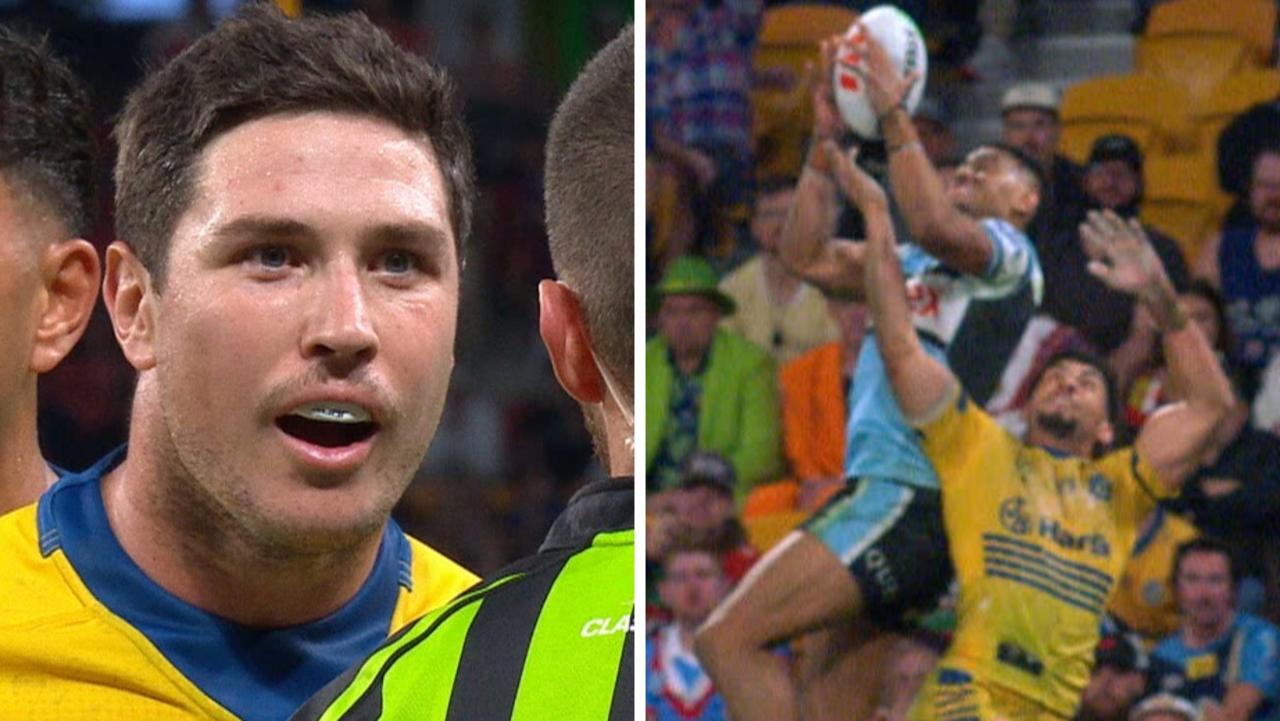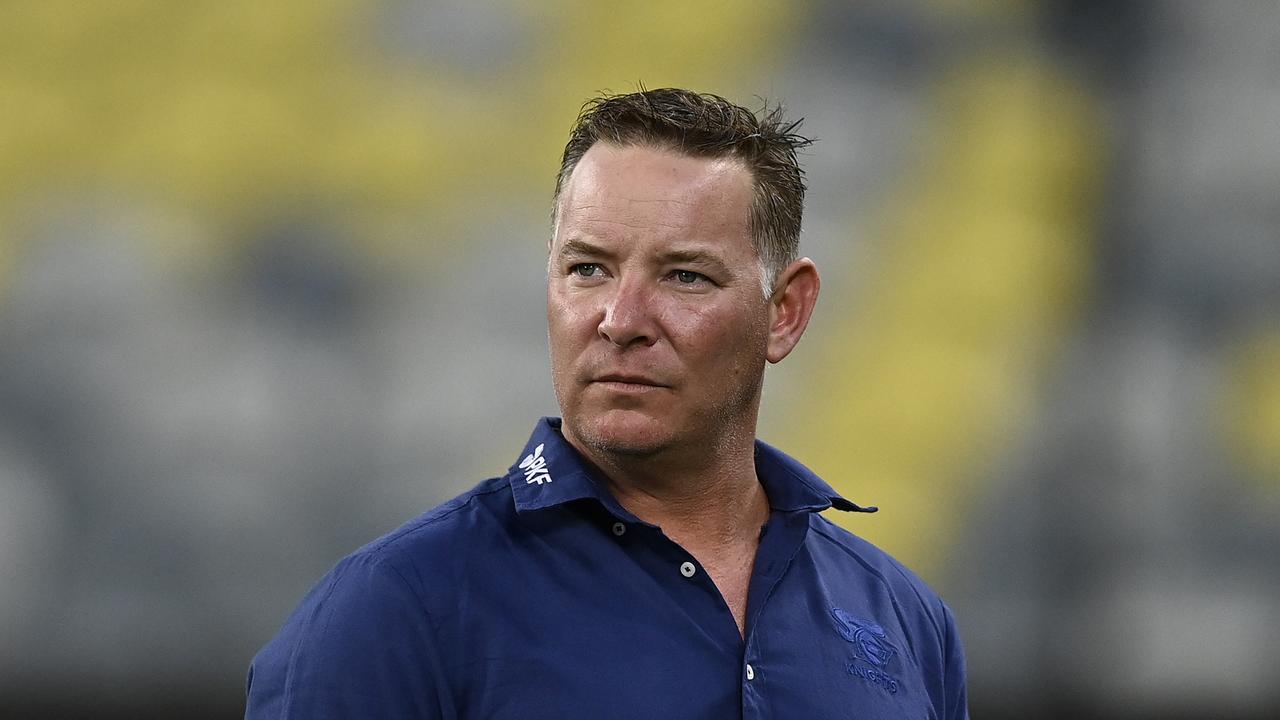Roosters coach Trent Robinson’s honest account of mental fog, impostor syndrome and other career challenges
Roosters coach Trent Robinson has opened up about his personal vulnerabilities in a candid interview that covers the “impostor syndrome” he suffered and a big change he had to make.
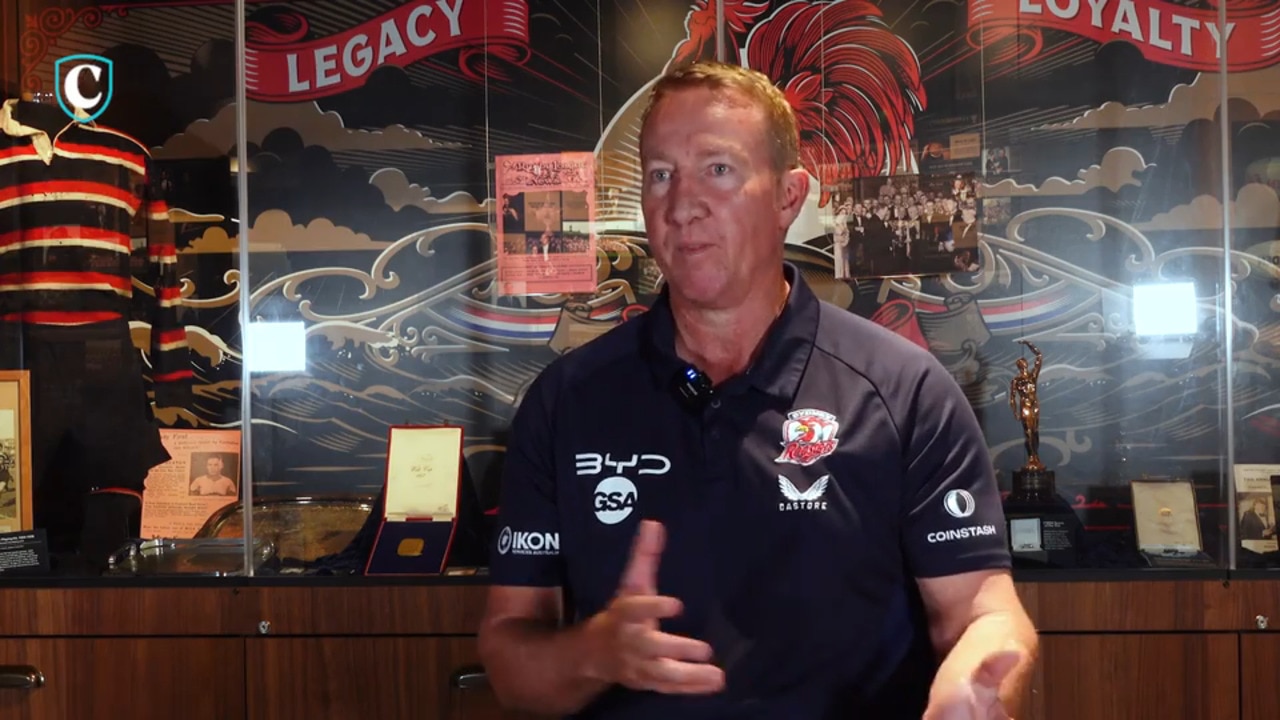
NRL
Don't miss out on the headlines from NRL. Followed categories will be added to My News.
Trent Robinson calls it the fog.
That mental state where he would be at home with his family, but spend all day thinking about work: video reviews, recruitment, next week’s game.
It descended on him and lasted almost a decade into his tenure as Sydney Roosters coach.
It invaded those precious moments, even the times when he was standing on the sideline watching his kids play footy.
In the most revealing and candid interview of his 13-year NRL coaching career, Robinson has opened up about his personal vulnerabilities and the “impostor syndrome” he suffered.
This is Robinson like you’ve never seen before. After the 30-minute interview, Robinson said privately: “I’ve never spoken about my family so publicly like that before.”
Sitting in the museum inside Roosters headquarters, encircled by the ghosts of his club’s 117-year history, Robinson talks about family, self doubts, fatherhood, football and coaching, before declaring: “The best is yet to come.”
Robinson keeps his life uncomplicated: it’s footy and family.
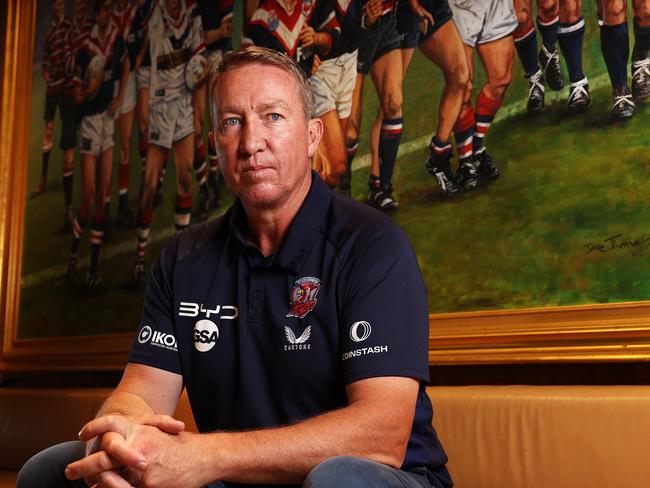
AM I GOOD ENOUGH
Robinson offered a deeply honest insight into the personal insecurity he confronted early in his coaching career, despite winning a grand final in his first season at Bondi.
“I felt like I started behind everyone, that’s just me. I started young and there is always that impostor syndrome that you get when you start as a young coach. I hadn’t played much NRL and felt I had to work harder than anyone else to try and catch up and that can take many, many years,” he said.
“You can have confidence and a vulnerability or doubt at the same time. They’re not separate things that live in separate people. They can live in one person and they definitely did with me.
“That’s also the fuel that you burn, when you have that feeling of, ‘I don’t know if I’m ready for this.’ Well, let’s get ready and what am I going to do about it? You just don’t sit in that feeling, there’s got to be an action to take to get better.”
“That’s when the fog comes, when you spend all that time talking and thinking about it. Those feelings of being confident – ‘I can do this’ – to – ‘I’m not sure I’m up to this’ – live in the same person.”
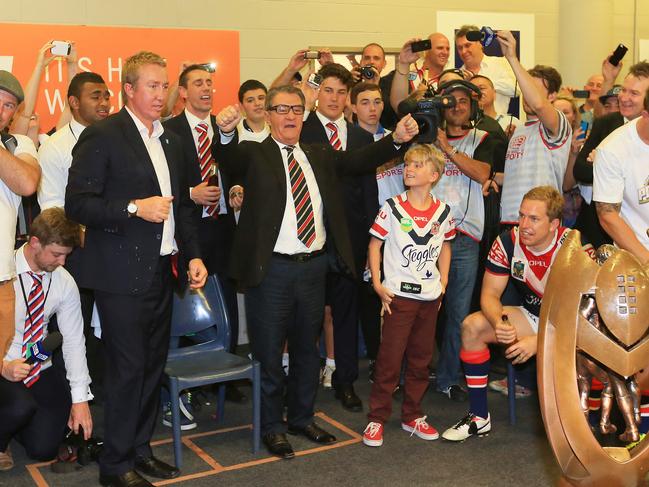
Does he still have these thoughts, even after winning three grand finals?
“Yeah, it’s being human,” he said. “Outwardly, people try to portray that everything is under control and it never is. The human process is that we’re not in control of everything.
“There are times when I look back and think I could have done better in certain periods, but that’s natural. I have to make sure I’m honest about my performances as well.
“I want to get better and better and feel like my best is still to come. That’s the beautiful human experiment – we can all be better if we’re open to it. That’s the search we’re all on. Let’s go again, let’s get better.”
FATHERHOOD FOCUS
Robinson would spend quality time with wife Sandra, and three kids, Noah, 15, Finn, 10, and Billie, 7, but the coach living inside him was still a dominant force – and it had to change.
“I felt I was in a fog for almost a decade, probably seven or eight years when I first came back (to the Roosters). I was in this fog, thinking constantly about work, how do I get better and how do I do that,” he said.
“There were times when I was standing on the sidelines watching (his kids play) junior footy and I was thinking about review and what we could do better.
“For the first few years, you get home and you’re dreaming about how we play the opposition on the weekend, what’s the strategy with recruitment, how are we going to deal with the media … all of that can blend in at home. There’s a bit of work to manage that in the right way.
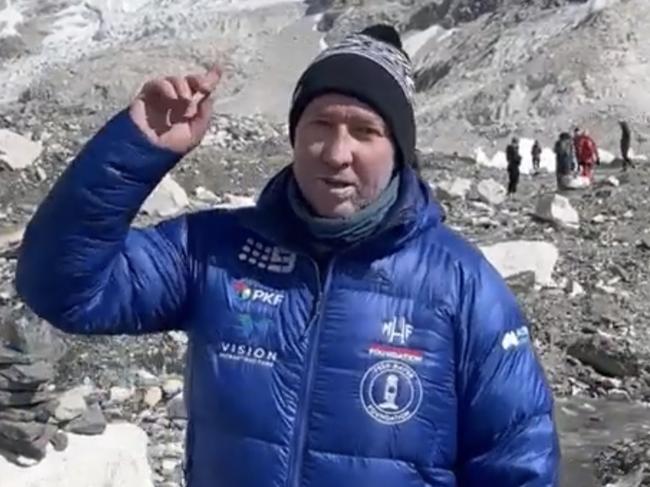
“I’d like to think if you asked them (the kids) that they wouldn’t have noticed it but I noticed enough that I needed to separate that. I felt like I had to be in that state to accelerate my learnings. If I knew it all then I wouldn’t have improved quickly.
“Over the course of time, you learn how to put your energy into the right things and be a bit more present when you’re there with them (his kids). The (coaching) role is all-consuming, 24/7, but how do you not live that at home? That’s the key.
“I just plan my day and mind better (now) so I don’t get stuck in the fog as much as I used to. There are different periods of the year that lend to that. You have to make sure you clean your energy every day.”
WORKING CLASS HEROES
Robinson wanted to end a well-worn misnomer about the Roosters coming from an elite background.
“We are so proud of our history at the Roosters – 1908 – a working class area come good, that’s what it is. People come at it from a high-flying area, the eastern suburbs, but we worked hard for this area,” he said.
“Every immigrant that came in during the 20th century came through the eastern suburbs while our team was playing, whether it was slums, depressions or world wars, it was felt in this area. That was the birth of the eastern suburbs and Sydney Roosters.
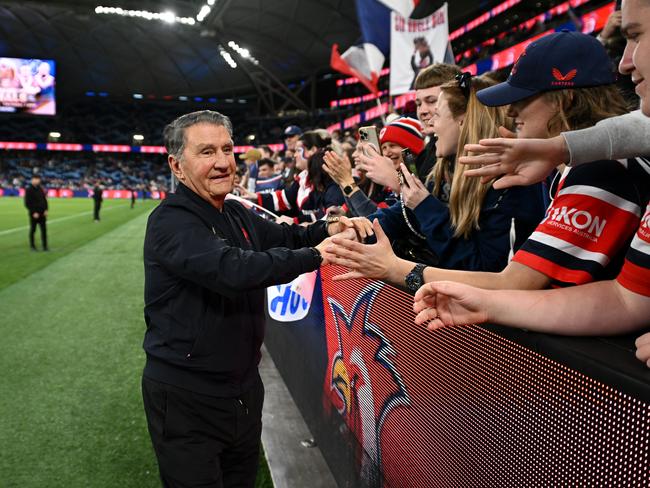
“We’ve come good and we wear that as a badge of honour. It’s definitely a privilege. Right from our chairman (Nick Politis) to our board, they are self-made, like this area.
“Aspirations don’t change year-on-year in these four walls (inside Roosters HQ), they are always the same but the process to get there shifts depending on the group you’ve got. Our aspirations are always really high. You never set a limit to what is possible and that’s no different this year.
“A coach is a service to the club and players. There are a lot of people that run this club so sometimes I feel I’m a representation of them so you have to be at the forefront. So when I’m speaking, it’s a personal view, but it’s not only that, it’s for all the staff, players and supporters.”
RIVAL COACH
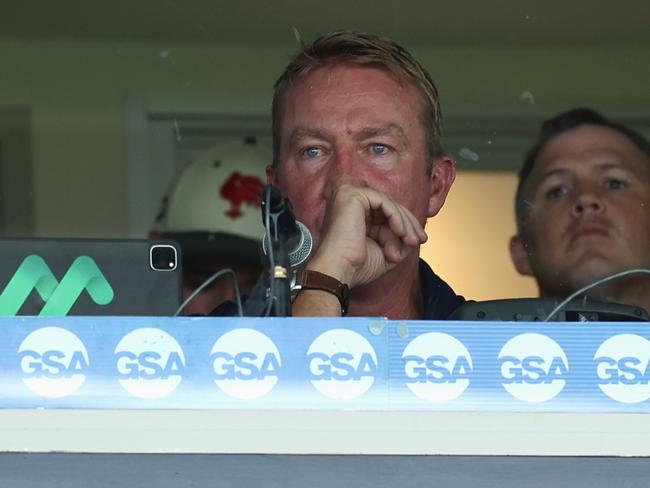
Could Robinson ever coach against the Roosters?
“My biggest body of work will be at this club. There is an end point for everybody, whenever that time comes. But this will be the biggest coaching period of my life,” he said.
“When it does end, I will go onto other things but I don’t know whether it will be in coaching. But you don’t dream about stuff. If you’re a coach and you start dreaming outside, you might as well stop. I don’t have any dreams outside.
“You dream outside your job then you’re finished. A lot of people try and plan to create a safety net for themselves, ‘if I’m not doing this then I will do that’. You’re done. You have to be all-in. If you’re not all-in then you might as well stop.”
I LOVE THIS CLUB
Robinson was open and honest about his club.
“This club has changed my life and is everything to me,” he said. “It’s changed my life, the life of my family and it’s been the major purpose in my life, outside of my family.
“This club is part of me. It’s not a job that I’m doing and it’s not just something I do by turning up in the morning and going home at night. It lives with me – footy and family, they are the two things.
“It’s more than a job. I came here as a 17-year-old, had four years (as a player), came back as an assistant coach, got my first coaching gig here at 35 and have spent 18 years of my life here.
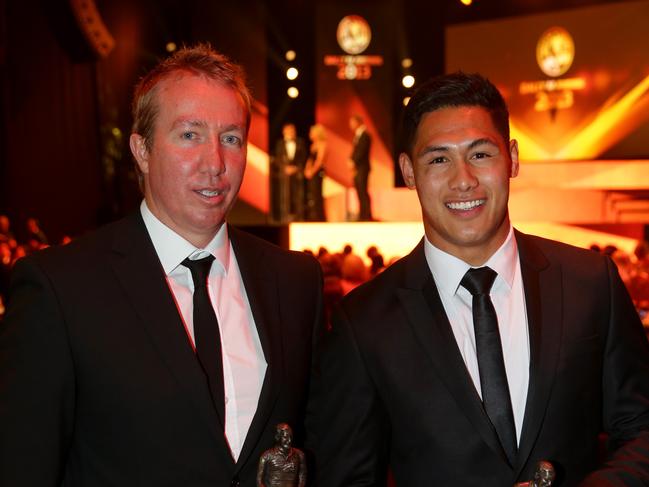
“The Roosters are traditional and incredibly progressive at the same time. If you look at Nick Politis, Mark Bouris (director), those sort of people, they know where they’re from, they stay consistent to history and are continually looking for what’s next, either from within their business or the Roosters.
“I always say we’re traditionally progressive – that’s who we are. Hours are irrelevant. It’s whatever time it takes to get the job done for that day.”
WHO IS ROBBO
Asked to reveal who he was in his own words, Robinson said: “A guy who is coaching a footy team, trying to be a good father and who’s curious about what he can do and what others can do.
“That’s who I am, it’s pretty simple. Even though we’re out there every week, I wish there was less exposure to who we are. I enjoy life with our players and staff. I love the fact we get to experience joy at the end of every week, or pain. When you feel those emotions weekly it’s a pretty good life.
“(Philosophies) have to be unique to you. They shift a bit but there’s basically two. We are here to be our best and we want to search for premierships and the philosophy with how we play is within that. And then I want people to be at their best off the field.
“It’s written on the walls (inside Roosters HQ). The hand that is dipped in blood can also be the hand that rocks the cradle.”
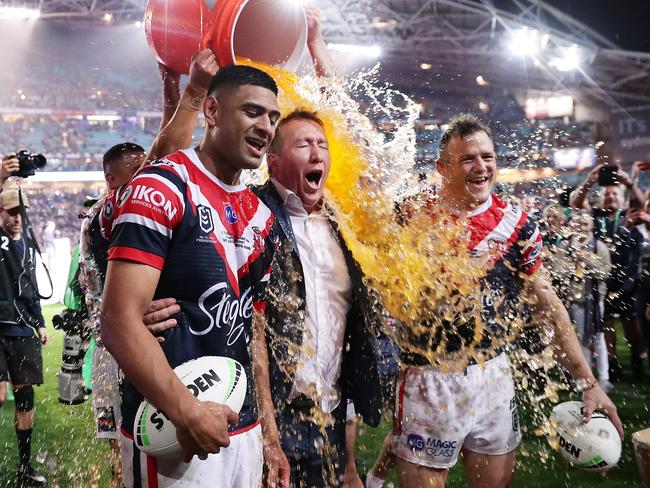
NICK’S THE MAN
Robinson and his chairman Nick Politis form a formidable pair.
“It’s just a gift to talk to Nick every day and watch a man who is more passionate than you are about a place; who makes decisions based on what’s best for the club and not what’s best for him,” Robinson said.
“His decision making is really simple and clear, he can see around corners and is a great strategist. He is a few steps ahead and I have been able to pick up (many traits) over the last 15 years.”
Asked whether Politis was a mentor, Robinson said: “Yeah. Nick would probably hate people saying that but he has guided me about how to lead this club and the decision making stops becoming about what’s best for me as a coach – it’s purely about what’s best for the Roosters. He has definitely been that (a mentor) to me.”
THE REBUILD
The Roosters are in the midst of a rebuild. They have a burgeoning young roster which lost multiple high-profile players after last season.
“I have heard that talk about us building for the future but I think that future can be this year. But with how we started (winning one of the first five games), we obviously have to progress quickly. Our game is getting better and I’m pretty positive about where it will be in August,” he said.
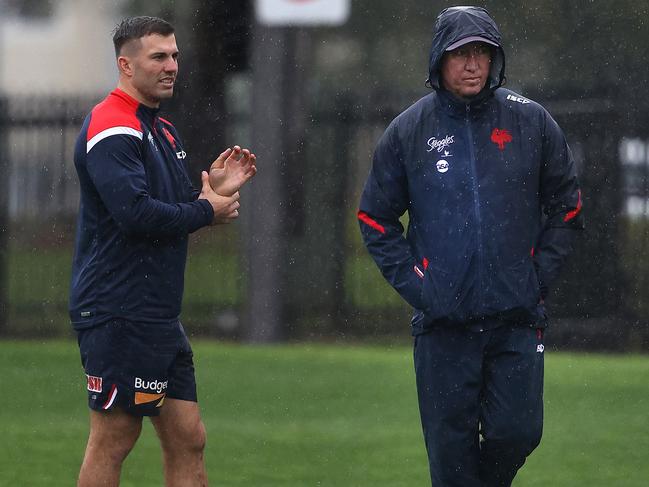
“There is always belief in the players. We will improve month-on-month. If we hold our cool, we have a middle tier of players that are now our senior players, under ‘Teddy’ (James Tedesco), and they are getting better at leading on and off the field.
“Then we have five or six players who are under ten games so we will keep playing them and playing them and they will develop month-on-month. We still have a couple of key players to come back.”
SIN BIN DRAMA
Robinson said: “You have to ask: ‘Why has it happened?’ Because they want us to tackle lower and protect the player and that’s a good thing but have they over-calibrated? Yes they have.
“Let’s regulate it, have less in the sin bin but get the tackles down. That’s pretty simple. I don’t think anyone goes out to hit high. We’re the fastest contact sport so therefore there is pressure on our techniques compared to any other tackling sport.
“So we’re at the forefront and we will have more high tackles than other contact sports and they have to keep getting us to be better through sanctions while keeping the integrity of the game as we try to get there. A little recalibration would be good.”
Originally published as Roosters coach Trent Robinson’s honest account of mental fog, impostor syndrome and other career challenges


